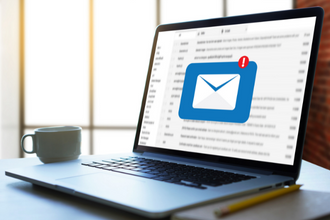6 solutions for tackling the biggest drains on your time as a business owner
27 September 2021
From meetings to emails to billing, do you feel like you don’t have the time to do everything you need to do for your business? Find how to save valuable time so you can focus your energy where it really matters.
1. Stop wasting time on email
You aren’t always being more productive by answering emails right away. Even short interruptions have the opposite effect. “It can take up to 15 minutes to regain your initial focus,” says Marco Roy, a coach with the École d’entrepreneurship de Beauce and president of Étape 21.
Simple steps you can take to be more productive
- Check email at specific times. For example, you might want to check once in the morning, at noon and end of day. Tell your customers, colleagues and employees that you’ll reply within 24 hours. If it’s urgent, call them.
- Keep your reply short, if possible. One or two clear sentences are often enough to prevent more questions and emails.
- Apply the rule of 3. After the third email, pick up the phone.
- Avoid CCing as much as possible.
- Cut down on the number of team messages without impeding the flow of information. Roy suggests using an app like Telegram. With groups, everyone receives the same information in real time in the same discussion thread.
2. Plan, plan, plan
Roy recommends using the “Big 3” approach, whereby you identify the 3 biggest priorities for the week and then add 3 or 4 other tasks you need to deal with. The same principle applies on a day-to-day basis. “If I fit them into my day, I also make sure to leave them enough room. It becomes non-negotiable,” says Roy.
Tips
- Decide when you’ll start and end your day. By making yourself stop at a specific time, you’ll make the effort to achieve your daily goals.
- Set aside 5 minutes to take stock of your day, determine how satisfied you are and identify where you can make improvements the next day.
3. Make yourself available when it works for you
Create a system to let others know your availability. For example, you could use door plates:
- Red: Do not enter
- Yellow: Disturb only if it’s important
- Geen: Available
4. Make meetings more efficient
It’s not easy to cut down on meeting time, but at the very least, you can still keep them from dragging on unnecessarily. You probably already know: an agenda is essential!
Besides a list of prioritized topics, an agenda determines the:
- Meeting end time
- Time allotted for each topic
- Timekeeper, who makes sure everyone sticks to the schedule and ends the meeting at the agreed-upon time, whether it’s over or not
- Facilitator, who keeps participants focused on the topic at hand
5. Qualify your prospects more effectively
Use 4 or 5 criteria to identify your ideal customer, and then ask prospects a few questions to determine if they meet them:
- What type of business do you own?
- Why do you need this type of service?
- How exactly can I help you?
And don’t hesitate to ask customers for referrals.
6. Reduce the time spent on quotations
As with everything else, the secret lies in setting aside dedicated time for this task. You’ll be more productive if you focus all your energy on it without letting yourself get distracted by everything else. And automate this process whenever possible so you can spend less time on this repetitive, yet essential, task.
Source : Blogue Desjardins
